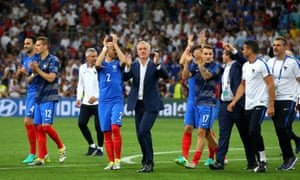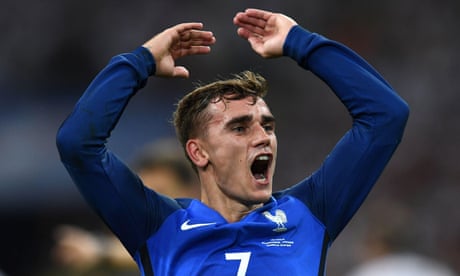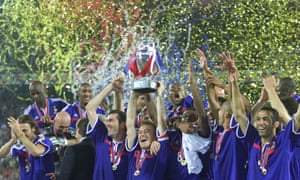Didier Deschamps: the water carrier who holds France in his trusted hands
Deschamps was captain of the side who won the 1998 World Cup and his achievements as a manager have further endeared him to a French public confident he can oversee victory against Portugal in the Euro 2016 final
 Didier Deschamps gave France a belief they could beat Germany that was absent during their World Cup quarter-final defeat in 2014. Photograph: Alex Livesey/Getty Images
Didier Deschamps gave France a belief they could beat Germany that was absent during their World Cup quarter-final defeat in 2014. Photograph: Alex Livesey/Getty Images
“We don’t let anything go. Not now, eh? Not now.” So barked Didier Deschamps in the Stade de France at crunch time. The staccato message, delivered with intense conviction, was spelled out at half-time of the 1998 World Cup final. France were leading Brazil. Identikit headed goals from Zinedine Zidane had done the damage. Almost too good to be true.
Deschamps took absolute control of the dressing room to make sure his team-mates maintained their focus, retained their coolness, as they closed in on the prize. He was 29 at the time – a small man, with giant authority. His team-mates hung on his every word.

Eighteen years on, France could have no better guiding light to direct their team through Sunday’s European Championship final. Deschamps knows his way around the Stade de France with his eyes closed. His personal history with Les Bleus – a century of caps and the honour of captaining his country to a World Cup and European Championship double – guarantees respect. But it is notable he is admired as a manager for what he does now, not for the decorated CV he achieved scampering with his boots on. The French public trust him to look after the team with unswerving focus. They look at the man they have always called “Dede” and see an ordinary-looking guy who they can have a joke with, put their arm around, as if he might be a friend or a brother. But they also see a driven, practical, accomplished manager with a steely winning mentality.
Deschamps also has a reputation as a lucky manager. Superficially, late goals and a kind draw until the semi-finals during Euro 2016 might add to that impression but few coaches of nations who carry the expectancy of being among the favourites can hope to oversee a tournament smoothly. Deschamps has had his fair share of problems. He has made his choices and held his nerve.
That has been a necessity dating back to the thorny topic of squad selection last spring, with the absence of Karim Benzema and the controversial accusations of Eric Cantonarequiring a calm and collected response. Then came the defensive crisis, with five options dropping down like dominos. Once the games began other issues demanded attention: debates about getting Paul Pogba to click, critiques of Olivier Giroud, questions about tactical formation. Deschamps gave it all careful thought and made big calls – at one point swapping Pogba and Antoine Griezmann for Anthony Martial and Kingsley Coman, at another directing Blaise Matuidi to the right, then in the semi-final against Germany showing faith in the inexperienced Samuel Umtiti. He has not been afraid to gamble and then twist during games. Those big calls have led to big rewards.
France have evolved during this competition. There was something very subtle but striking in comparing the team who took on Joachim Löw’s established champions in Lyon with the same fixture at the World Cup two years ago. The France of 2014 never looked like they truly believed they could beat Germany. This version did, even during the periods when they weathered the waves of pressure. The reliance on individual moments that marked their early wins over Romania and Albania has developed into a more rounded team effort. It was common knowledge France possessed exciting talents but the challenge to fast-track them into a cohesive whole has been an intriguing process.
Revisiting the tale of the moment Deschamps decided to call an end to his international playing career gives an insight into the way he thinks about football. As France won their Euro 2000 final against Italy, when David Trezeguet’s golden goal winner touched the net, Deschamps was hit by the realisation his time was up. Roger Lemerre, France’s manager, went to embrace the captain during the celebrations and Deschamps told him there and then it was over. He did not want two years of friendlies at that stage of his life (France were already qualified for the next tournament as the defending champions). Lemerre told Deschamps he could pick and choose his matches but as an all-or-nothing kind of a guy that would never work. Deschamps summed up his approach to playing for France emphatically: “I gave all my energy, my faculties, my time, my heart and my spirit.”

 Didier Deschamps gave France a belief they could beat Germany that was absent during their World Cup quarter-final defeat in 2014. Photograph: Alex Livesey/Getty Images
Didier Deschamps gave France a belief they could beat Germany that was absent during their World Cup quarter-final defeat in 2014. Photograph: Alex Livesey/Getty Images“We don’t let anything go. Not now, eh? Not now.” So barked Didier Deschamps in the Stade de France at crunch time. The staccato message, delivered with intense conviction, was spelled out at half-time of the 1998 World Cup final. France were leading Brazil. Identikit headed goals from Zinedine Zidane had done the damage. Almost too good to be true.
Deschamps took absolute control of the dressing room to make sure his team-mates maintained their focus, retained their coolness, as they closed in on the prize. He was 29 at the time – a small man, with giant authority. His team-mates hung on his every word.

Eighteen years on, France could have no better guiding light to direct their team through Sunday’s European Championship final. Deschamps knows his way around the Stade de France with his eyes closed. His personal history with Les Bleus – a century of caps and the honour of captaining his country to a World Cup and European Championship double – guarantees respect. But it is notable he is admired as a manager for what he does now, not for the decorated CV he achieved scampering with his boots on. The French public trust him to look after the team with unswerving focus. They look at the man they have always called “Dede” and see an ordinary-looking guy who they can have a joke with, put their arm around, as if he might be a friend or a brother. But they also see a driven, practical, accomplished manager with a steely winning mentality.
Deschamps also has a reputation as a lucky manager. Superficially, late goals and a kind draw until the semi-finals during Euro 2016 might add to that impression but few coaches of nations who carry the expectancy of being among the favourites can hope to oversee a tournament smoothly. Deschamps has had his fair share of problems. He has made his choices and held his nerve.
That has been a necessity dating back to the thorny topic of squad selection last spring, with the absence of Karim Benzema and the controversial accusations of Eric Cantonarequiring a calm and collected response. Then came the defensive crisis, with five options dropping down like dominos. Once the games began other issues demanded attention: debates about getting Paul Pogba to click, critiques of Olivier Giroud, questions about tactical formation. Deschamps gave it all careful thought and made big calls – at one point swapping Pogba and Antoine Griezmann for Anthony Martial and Kingsley Coman, at another directing Blaise Matuidi to the right, then in the semi-final against Germany showing faith in the inexperienced Samuel Umtiti. He has not been afraid to gamble and then twist during games. Those big calls have led to big rewards.
France have evolved during this competition. There was something very subtle but striking in comparing the team who took on Joachim Löw’s established champions in Lyon with the same fixture at the World Cup two years ago. The France of 2014 never looked like they truly believed they could beat Germany. This version did, even during the periods when they weathered the waves of pressure. The reliance on individual moments that marked their early wins over Romania and Albania has developed into a more rounded team effort. It was common knowledge France possessed exciting talents but the challenge to fast-track them into a cohesive whole has been an intriguing process.
Revisiting the tale of the moment Deschamps decided to call an end to his international playing career gives an insight into the way he thinks about football. As France won their Euro 2000 final against Italy, when David Trezeguet’s golden goal winner touched the net, Deschamps was hit by the realisation his time was up. Roger Lemerre, France’s manager, went to embrace the captain during the celebrations and Deschamps told him there and then it was over. He did not want two years of friendlies at that stage of his life (France were already qualified for the next tournament as the defending champions). Lemerre told Deschamps he could pick and choose his matches but as an all-or-nothing kind of a guy that would never work. Deschamps summed up his approach to playing for France emphatically: “I gave all my energy, my faculties, my time, my heart and my spirit.”

Didier Deschamps lifts the European Championship trophy after guiding France to victory in the 2000 final against Italy. Photograph: Michele Limina/EPA
The same applies to his principles as manager. In his maiden coaching role at Monaco he pulled together a team by promoting youth, plucking some bargains and loan deals, and inspiring the club to the 2004 Champions League final. His next experience took him to Juventus, where he helped the Old Lady rediscover her footing in Serie A following the demotion that accompanied the calciopoli scandal. Then Deschamps went back to another of his old hunting grounds, Marseille. His motivating touch brought them their first Ligue 1 title for 18 years. While his players let loose and bounced on tables as they sang of their joy, the manager declined to join in. “I am not a very good dancer,” he said. But really, he just wanted the success to be lavished on his players, not him. He does not want to dominate the story.
Those instincts will be central to his preparations for Sunday’s final against Portugal. He is not sentimental enough to get drawn into his own emotions to be back at the Stade de France for a final, with all the personal echoes of 1998. He will try to be respectful of the nuances of his team being in this place in search of sporting glory just a few months after the terror attacks on Paris that cost so many lives, with the stadium itself targeted.
It was in the aftermath of the atrocities that Deschamps took his team to London for a friendly at Wembley to attempt to carry on. Despite being visibly shocked the circumstances required him to be a statesman. He spoke with great dignity. “More than ever now, sport knows no colour, no religion,” he said. “All are welcome in sport. It is about diversity in every aspect. It is a way of uniting people and it’s important it continues to do that.”
These days Deschamps is regarded as the most accomplished French manager of his generation. The water carrier, as he was flippantly known after one of Cantona’s choice expressions to describe a playing style based on doing the leg work for those with more creative talent, now holds the hopes of his nation in his hands. It is a cargo he will take responsibility for with every ounce of his footballing being.
If France do overcome Portugal, that would make Deschamps only the second man after the German Berti Vogts to win the Euros as a player and manager. It probably would not be enough to encourage him to dance on any tables but that is just the way he likes it.
The same applies to his principles as manager. In his maiden coaching role at Monaco he pulled together a team by promoting youth, plucking some bargains and loan deals, and inspiring the club to the 2004 Champions League final. His next experience took him to Juventus, where he helped the Old Lady rediscover her footing in Serie A following the demotion that accompanied the calciopoli scandal. Then Deschamps went back to another of his old hunting grounds, Marseille. His motivating touch brought them their first Ligue 1 title for 18 years. While his players let loose and bounced on tables as they sang of their joy, the manager declined to join in. “I am not a very good dancer,” he said. But really, he just wanted the success to be lavished on his players, not him. He does not want to dominate the story.
Those instincts will be central to his preparations for Sunday’s final against Portugal. He is not sentimental enough to get drawn into his own emotions to be back at the Stade de France for a final, with all the personal echoes of 1998. He will try to be respectful of the nuances of his team being in this place in search of sporting glory just a few months after the terror attacks on Paris that cost so many lives, with the stadium itself targeted.
It was in the aftermath of the atrocities that Deschamps took his team to London for a friendly at Wembley to attempt to carry on. Despite being visibly shocked the circumstances required him to be a statesman. He spoke with great dignity. “More than ever now, sport knows no colour, no religion,” he said. “All are welcome in sport. It is about diversity in every aspect. It is a way of uniting people and it’s important it continues to do that.”
These days Deschamps is regarded as the most accomplished French manager of his generation. The water carrier, as he was flippantly known after one of Cantona’s choice expressions to describe a playing style based on doing the leg work for those with more creative talent, now holds the hopes of his nation in his hands. It is a cargo he will take responsibility for with every ounce of his footballing being.
If France do overcome Portugal, that would make Deschamps only the second man after the German Berti Vogts to win the Euros as a player and manager. It probably would not be enough to encourage him to dance on any tables but that is just the way he likes it.
Comments
Post a Comment